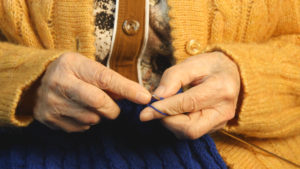

As the world changes and technology develops at a dizzying pace, certain skills that were once necessary for survival are being all but forgotten. It’s amazing to think how many of the things we had to learn to do out of necessity, skills that were seen as basic common knowledge, have become rare novelty skills, using tools and technologies that young people today may never have heard of.
Here are 9 skills that most members of future generations may never have.
1: Using record players, audio cassettes, and VCRs
The tools we use to listen to music and watch movies have evolved beyond recognition in the past couple of generations. We’ve gone from records to audiotapes to CDs to streaming music from apps in the blink of an eye.
Our grandkids will never know how to place the needle gently on the record without scratching it (and they may never fully understand the phrase, “like a broken record!”). They’ll never know the challenge of creating a mixtape of your favorite songs from the radio, or how to straighten out a tangled audiotape using a pencil!
2: Using analog phones
Remember when a phone was just a phone and not a tiny supercomputer carried around in our pockets?
Many young people today don’t even really understand why we use the verbs “dialing” or “hanging up” to describe what we do with phones! They’ll never know what it was like to actually memorize a phone number other than their own; to answer a phone without having any idea who was calling; to have to sit next to it while talking on it, or risk yanking the cord out of the wall; or to have to share a line with everyone in the house and yell at your sister to finish up already so you could make a call or use the Internet!
3. Writing letters by hand and mailing them
There’s no denying the convenience emailing and texting have brought to the world of long-distance communication, but it’s a little sad that long-form, handwritten letters are becoming a lost art. There’s nothing quite like receiving a physical letter that someone took the time to sit and write out for you by hand.
Speaking of writing out by hand:
4. Reading and writing in cursive
Cursive writing was once a standard skill. Before typewriters and then computers became commonplace, everything was written out by hand, and writing in cursive is faster and more efficient than writing in print.
While cursive was still taught to schoolchildren in the 90s, schools stopped requiring students to use cursive when writing assignments, and most of them got used to writing in print. Today, the skill isn’t even taught anymore. To younger generations, cursive might as well be a secret code alphabet used only by older people.
5. Using manual research methods
Remember when researching a subject meant leaving the house, walking to a physical library, asking the librarian for an index, selecting some reference books, finding said books on the shelves, opening them, searching their indexes, opening them to the right page, and finding the information you were looking for?
For young people today, research means simply opening their mouths and saying “Hey Google” or “Hey Alexa” and asking a question. Serious research means sitting at a computer, typing the question, and trying to determine which of the thousands of results that immediately appear actually come from reliable sources. (Or, of course, using a designated research site like MyHeritage, which houses 18.2 billion historical records.)
Our grandkids may never know how to look up a word in a physical dictionary or seek an entry in the correct volume of the encyclopedia.
6. Preparing food the old-fashioned way
There’s a reason they’re called “convenience foods” and “convenience stores”: with the busy modern lifestyle, most people don’t have time or patience to farm their own vegetables, grow and slaughter their own livestock, can fruits and vegetables, make their own cheese, or create stocks and sauces from scratch.
Making sourdough bread had a bit of a comeback during the COVID pandemic because people were stuck at home with nothing to do for weeks and months on end, but it was a short-lived phenomenon. Most of these activities have become specialty skills practiced only by people who take a specific interest in learning them.
7. Creating and mending clothing by hand
Clothing has become so inexpensive to produce in recent years that “fast fashion” has entered the lexicon as an environmental and ethical concern. It’s almost as if clothing is produced to be disposable: it’s so flimsy and delicate that you can’t even expect to wear it more than a few times, but because it’s so cheap, you can just toss it and buy something new. Many young people don’t see a point in learning to mend their clothes or darn their socks for this reason.
It’s even rarer to find young people who know how to actually sew their own clothes from scratch. Crocheting, knitting, and quilting have become hobbies instead of necessary life skills.
8. Building furniture from scratch
Along a similar vein, how many people today know how to build their own bookshelves or dining room set from scratch? Furniture may not be as inexpensive as clothing has become, but the amount of time, energy, and skill it takes to build a piece of furniture makes it impractical for the busy modern person.
9. Speaking the languages of their ancestors
We live in a world where immigration from one country to another is quite common, and it’s a known phenomenon for the native tongues of immigrants to become forgotten within a generation or two. This is seen as a natural part of the immigrant experience, but it can be sad for grandparents to have difficulty communicating with grandchildren who don’t speak their language — especially if it is a rare language that is in danger of becoming extinct.
Passing what you know on to your grandchildren could be one of the greatest gifts you could give them — and there is no greater treasure than the collective knowledge of the generations that came before you. Start building your family tree today to preserve the wisdom and stories of your ancestors for future generations.











